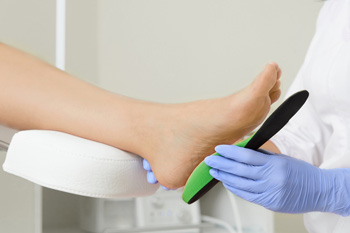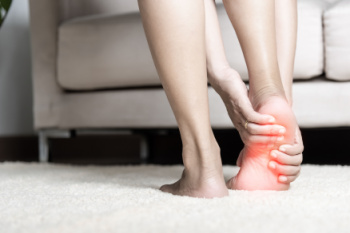(517) 487-5171
Fax (517) 908-0172

Custom-made foot and ankle orthotics play a vital role in diabetic foot care by addressing the unique challenges posed by this condition. Diabetes can lead to peripheral neuropathy and impaired circulation, leaving the feet vulnerable to injuries and ulcers. Left untreated, these complications can escalate, potentially resulting in severe infections, tissue damage, and possibly amputation. Orthotics designed specifically for diabetic patients offer several benefits. They help redistribute pressure away from areas prone to ulceration, thereby reducing the risk of wounds. Additionally, orthotics can improve stability and alignment, which is helpful for preventing falls and injuries. By providing cushioning and support, they also alleviate discomfort and pain associated with diabetic neuropathy. If you have diabetic foot issues, it is suggested that you schedule an appointment with a podiatrist to discuss whether orthotics can help you.
If you are having discomfort in your feet and would like to try orthotics, contact Dr. Gary Cesar from Michigan Foot and Ankle Center. Our doctor can provide the care you need to keep you pain-free and on your feet.
What Are Orthotics?
Orthotics are inserts you can place into your shoes to help with a variety of foot problems such as flat feet or foot pain. Orthotics provide relief and comfort for minor foot and heel pain but can’t correct serious biomechanical problems in your feet.
Over-the-Counter Inserts
Orthotics come in a wide variety of over-the-counter inserts that are used to treat foot pain, heel pain, and minor problems. For example, arch supports can be inserted into your shoes to help correct overarched or flat feet, while gel insoles are often used because they provide comfort and relief from foot and heel pain by alleviating pressure.
Prescription Orthotics
If over-the-counter inserts don’t work for you or if you have a more severe foot concern, it is possible to have your podiatrist prescribe custom orthotics. These high-quality inserts are designed to treat problems such as abnormal motion, plantar fasciitis, and severe forms of heel pain. They can even be used to help patients suffering from diabetes by treating foot ulcers and painful calluses and are usually molded to your feet individually, which allows them to provide full support and comfort.
If you are experiencing minor to severe foot or heel pain, it’s recommended to speak with your podiatrist about the possibilities of using orthotics. A podiatrist can determine which type of orthotic is right for you and allow you to take the first steps towards being pain-free.
If you have any questions please contact our offices located in Lansing and Mt. Pleasant, MI . We offer the newest diagnostic and treatment technologies for all your foot and ankle needs.
 Bursitis in the heel occurs when the bursae in the foot become inflamed. Bursae are small fluid-filled sacs near the joints that cushion the bones and tendons. This inflammation often results from overuse or excessive pressure on the heel, commonly seen in athletes or individuals who engage in frequent running or jumping. Heel bursitis can cause pain in the back of or deep inside the heel, which may worsen with activity and improve with rest. The pain may also be more pronounced in the morning or after long periods of inactivity. Bursitis can also lead to swelling, warmth, and redness in the affected area. Treatment typically involves resting the foot, taking anti-inflammatory medications, and wearing heel pads or orthotic devices to relieve pressure on the heel. Sometimes exercises are also recommended to strengthen the surrounding muscles and tissues. If conservative treatments fail, corticosteroid injections might be considered to reduce inflammation and pain. Taking steps to manage heel bursitis can prevent the condition from recurring and allow you to return to your regular activities without discomfort. If you have painful heels and suspect bursitis, it is suggested you make an appointment with a podiatrist for an evaluation.
Bursitis in the heel occurs when the bursae in the foot become inflamed. Bursae are small fluid-filled sacs near the joints that cushion the bones and tendons. This inflammation often results from overuse or excessive pressure on the heel, commonly seen in athletes or individuals who engage in frequent running or jumping. Heel bursitis can cause pain in the back of or deep inside the heel, which may worsen with activity and improve with rest. The pain may also be more pronounced in the morning or after long periods of inactivity. Bursitis can also lead to swelling, warmth, and redness in the affected area. Treatment typically involves resting the foot, taking anti-inflammatory medications, and wearing heel pads or orthotic devices to relieve pressure on the heel. Sometimes exercises are also recommended to strengthen the surrounding muscles and tissues. If conservative treatments fail, corticosteroid injections might be considered to reduce inflammation and pain. Taking steps to manage heel bursitis can prevent the condition from recurring and allow you to return to your regular activities without discomfort. If you have painful heels and suspect bursitis, it is suggested you make an appointment with a podiatrist for an evaluation.
Many people suffer from bouts of heel pain. For more information, contact Dr. Gary Cesar of Michigan Foot and Ankle Center. Our doctor can provide the care you need to keep you pain-free and on your feet.
Causes of Heel Pain
Heel pain is often associated with plantar fasciitis. The plantar fascia is a band of tissues that extends along the bottom of the foot. A rip or tear in this ligament can cause inflammation of the tissue.
Achilles tendonitis is another cause of heel pain. Inflammation of the Achilles tendon will cause pain from fractures and muscle tearing. Lack of flexibility is also another symptom.
Heel spurs are another cause of pain. When the tissues of the plantar fascia undergo a great deal of stress, it can lead to ligament separation from the heel bone, causing heel spurs.
Why Might Heel Pain Occur?
- Wearing ill-fitting shoes
- Wearing non-supportive shoes
- Weight change
- Excessive running
Treatments
Heel pain should be treated as soon as possible for immediate results. Keeping your feet in a stress-free environment will help. If you suffer from Achilles tendonitis or plantar fasciitis, applying ice will reduce the swelling. Stretching before an exercise like running will help the muscles. Using all these tips will help make heel pain a condition of the past.
If you have any questions please contact our offices located in Lansing and Mt. Pleasant, MI . We offer the newest diagnostic and treatment technologies for all your foot and ankle needs.

Cracked heels can be both painful and unsightly, but with proper foot care they are largely preventable. Begin by keeping your feet clean and moisturized. Regularly washing your feet with mild soap and drying them thoroughly helps prevent bacterial and fungal infections that can worsen heel cracks. Moisturize your feet daily, focusing on the heels, with a rich foot cream or moisturizer containing ingredients like urea or glycerin to hydrate and soften the skin. Exfoliating your heels weekly with a pumice stone or foot scrub helps remove dead skin cells and prevents the buildup of thick, dry patches. Wear properly fitting shoes with adequate support to reduce friction and pressure on the heels, and avoid walking barefoot, especially on hard surfaces. Finally, stay hydrated and maintain a balanced diet rich in vitamins and minerals to promote overall skin health. Cracked heels can be an uncomfortable foot condition, and if you have developed this ailment, it is suggested that you seek the help of a podiatrist. This type of doctor can effectively treat cracked heels and offer additional prevention techniques.
If the skin on your feet starts to crack, you may want to see a podiatrist to find treatment. If you have any concerns, contact Dr. Gary Cesar from Michigan Foot and Ankle Center. Our doctor can provide the care you need to keep you pain-free and on your feet.
Cracked Heels
It is important to moisturize your cracked heels in order to prevent pain, bleeding, and infection. The reason cracked heels form is because the skin on the foot is too dry to support the immense pressure placed on them. When the foot expands, the dry skin on the foot begins to split.
Ways to Help Heal Them
- Invest in a good foot cream
- Try Using Petroleum Jelly
- Ease up on Soaps
- Drink Plenty of Water
Ways to Prevent Cracked Heels
- Moisturize After Showering
- Skip a Shower
- Keep Shower Water Lukewarm
- Don’t Scrub Your Feet
If you are unsure how to proceed in treating cracked heels, seek guidance from a podiatrist. Your doctor will help you with any questions or information you may need.
If you have any questions, please feel free to contact our offices located in Lansing and Mt. Pleasant, MI . We offer the newest diagnostic and treatment technologies for all your foot care needs.









